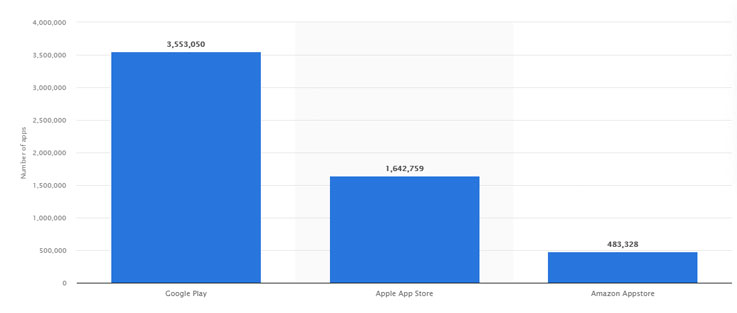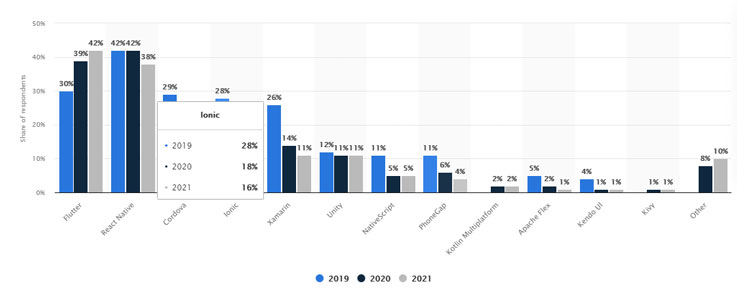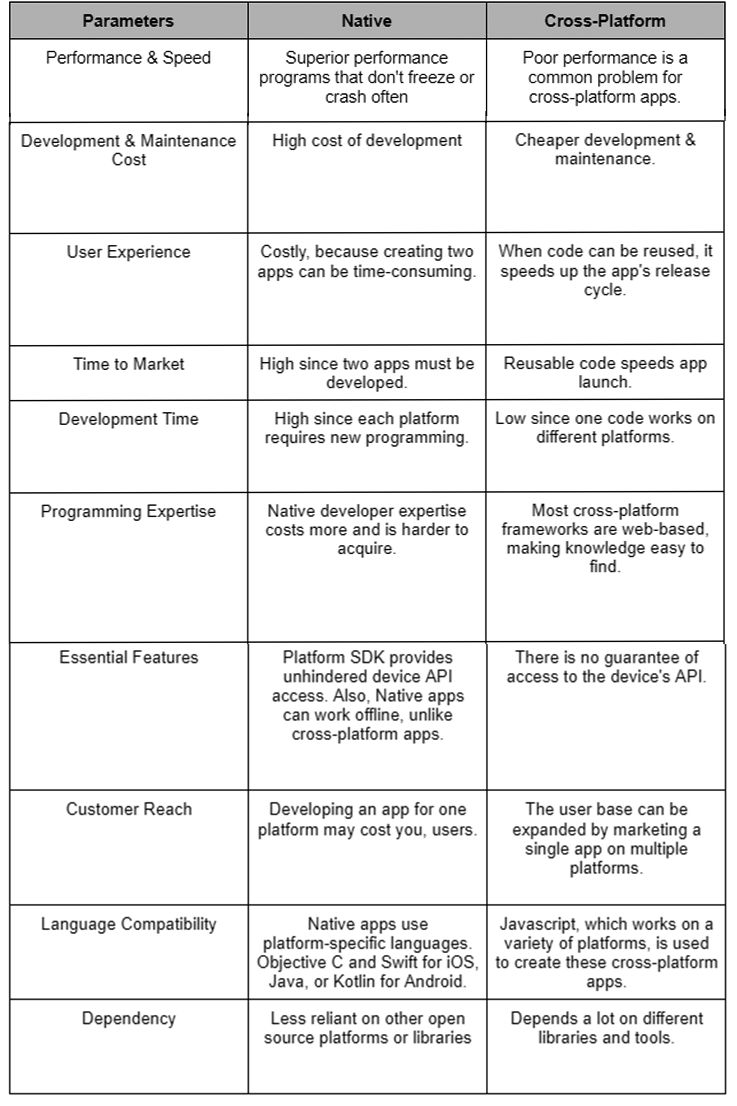People use mobile applications for various reasons, including keeping up with the news, researching a topic in-depth, playing a game, making purchases via their mobile devices, and interacting with friends and family on social media sites. These apps are available for download from various app stores, such as the Apple App Store and the Google Play Store. According to Statista’s data, as of the third quarter of 2022, Google Play boasted 3.55 million apps. Apple has the second largest app store, with 1.6 million iOS apps. While Apple and Google are continuously removing poor-quality content from their app stores, the total number of apps has been increasing. Take a look at the image below:

Image Souce:- Statista
Programmers build mobile apps to function with the user’s smartphone’s operating system. Android and iOS are the two main focus systems. The development approach will change depending on whether the app is designed for iOS or Android. Two methods exist for creating apps for mobile devices: native development and cross-platform development. One of the most crucial choices in every mobile app project is native or cross-platform development. This choice will affect the app’s architecture, development tools, and who can use it.
When developing a mobile app, you need to determine whether you will employ native or cross-platform development before releasing the app. Your decision’s long-term usefulness, as well as the amount of time and money it will cost you, will be impacted by your choice. In this article, we will discuss the benefits as well as the drawbacks of each technique.
What Is Native App Development
Developing a mobile application specific to a single operating system or platform is referred to as “native app development.” The application was developed using programming languages and technologies only compatible with a single operating system or device. The primary objective of native app development is to create applications compatible with a specific platform, such as iOS, Android, or Windows. The most significant benefit of native applications is that, by default, these applications are able to exploit the features of an operating system as well as all of the functions of the device such as the camera, GPS, contacts list, gravity sensor, gyroscope, and so on.
In addition, it is now much simpler for developers to use all of the complicated functionalities available, such as intricate networking, memory management, and many other features. You will need a distinct codebase for each platform, which will require additional effort and increase your costs.
Pros of Native Apps
1. Fast & Powerful
Since the development of native programs make use of tools and technologies that are directly related to the platform, this enables a direct and at the same time easier interaction of the application with the platform, which results in a significant increase in the speed and performance of the program as a whole, particularly when the graphics chip of the device is being used (therefore, almost all mobile games are native applications). “Native” applications also have a quicker response time and a reduced risk of crashing or freezing for the same reasons.
2. Platform Integration Choices
You are able to construct applications that make more extensive use of the features and capabilities of this platform if you have access to the platform’s functions and services in their entirety. For example, photographs and films created with native photography and video programs are typical of higher quality. The same can be said for functions such as Bluetooth, NFC, GPS, the audio module, and others.
3. Familiar Interface
This enables you to exploit the fullest potential capabilities of the device hardware and more fully comply with the rules because native applications are more closely integrated with the platform (which will be discussed below). This gives you the ability to build a user interface and user experience that is more acquainted with the platform’s audience.
4. Improved Online Marketplace Position
Native applications are typically rated higher in online marketplaces like the App Store and Google Play. This is because native apps integrate more closely with the platform and the device, and they also provide a better user experience. In addition, there are hypotheses floating about that the ranking systems on these websites are, a priori at least, friendlier to “native” applications.
5. Effective UI/UX Approach
The user interfaces of apps designed for iOS and Android are significantly different from one another. A customer who has a preference for a particular platform is likely accustomed to a specific screen layout. In this aspect, users and developers alike find that native mobile app development can provide a higher level of convenience. The excellent performance can be attributed to the interaction that takes place directly between the code and the underlying resources. In general, native apps offer a superior user experience (UX) that is more consistent with the platform on which they run.
Cons Of Native App Development
1. Increased App Development Time & Cost
The cost of developing an application will be higher if it is necessary to create a separate version of the software for each of the multiple different platforms. This is due to the fact that engineers will need to write two separate code bases. Adapting the design of the user interface and user experience (UI/UX) for each platform can also take quite a long time, which would “inflate” the cost of the development even further.
2. Dependence on One Mobile Operating System
Software developers employ a language environment developed exclusively for the operating platform while working on native solutions. This renders the program incompatible with platforms that use different operating systems. For example, if you target India, where more than 90% of smartphones run on Android, this is not always a problem. However, more often than not, because of this approach, you will limit the reach and availability of your servicing, product, or service.
3. Lost Financial Opportunities (profits)
If you limit your customer base to only one mobile platform, you are limiting the potential financial gain you could receive. Especially in the event that nobody thinks about moving the project to other mobile platforms throughout the design and development stages, which could happen in the event that the project is successfully launched.
What Is Cross-Platform App Development
Cross-platform apps, in contrast to native apps, share a single codebase across multiple devices and operating systems. Since 70- 90% of the code can be used across different platforms, developing such an app is more efficient and economical. It’s up to you to write the rest of the code in a native using frameworks like Xamarin, React Native, Ionic, and Flutter. Talking about the frameworks of Cross- Platform apps, Flutter is the most popular cross-platform mobile framework used by coders throughout the world. According to the results of the survey, 42% of software engineers made use of Flutter. Check out the adjoining graph for a more in-depth study of Cross-platform mobile frameworks used by software developers worldwide from 2019 to 2021

Image Souce:- Statista
Moving back to the cross-platform overview, the advantages of cross-platform apps are numerous, including low development costs, flexible features, and simple integration. Keep in mind that the fundamental motivation for cross-platform solutions is the enhancement of the foundational phases of mobile app development, not the convenience of your users. The source code for these applications is compiled to run on multiple platforms.
Pros of Cross-Platform App Development
1. Universal Code Base
The ability to use a single code base across many mobile platforms is arguably the biggest benefit of cross-platform programming. This means that rather than learning and utilizing many different technology stacks for each mobile platform/operating system, the development team needs to learn one common one.
2. Rapid Development
Developers can concentrate on one technology stack, exploring and reaping its benefits without learning numerous stacks to create cross-platform solutions. Using a single codebase may speed up the initial deployment of an app on several platforms simultaneously and simplify subsequent changes.
3. Cost-Effective & Faster Development
Cross-platform development has several benefits, but one of the most notable is the reduction in development time for multiple-platform support. Savings in both time and money depending on the specifics of the project’s tasks and the approach is taken to complete them. When comparing React Native to native development, for instance, you can expect a 50% reduction in app development time. By leveraging React Native and ready-made components, developers may quickly add functionality to your project. By using React Native, you can make an app that works on multiple platforms; all you have to do is you can hire a React Native developer that can produce powerful software for your growing company.
4. Allowing the Same UX & Interface
It is critical for businesses to maintain a consistent user experience across all platforms, which you can accomplish with the help of a single development team working off of a shared codebase. In addition, it enables you to execute a “seamless” transition from one platform to another, such as from a mobile phone to a tablet, laptop, desktop computer, or television.
5. Across Platforms
In terms of developing navigation and design, iOS and Android have some distinct characteristics from one another. When developing for many platforms, the most common UI variations are taken care of automatically. Even in a team with strong communication skills, there may still be some variance in how functions are implemented while working with native development. Because all platforms use the same codebase, cross-platform programming rarely encounters situations like the one described above. Additionally, it enables you to construct a more consistent brand identity across apps on both platforms with less effort required on your part.
Cons of Cross-Platform App Development
1. Reduced Efficiency
The efficiency with which an app function is crucial. Although the relative speed of native software and a cross-platform app with identical features can vary widely depending on several factors, the native app will run a bit quicker. However, in most cases, the performance differences are minimal, especially for simple programs.
2. Challenging Coding Techniques
For optimal performance, cross-platform apps must consider the wide variety of devices and operating systems. This results in greater work for developers who must account for the unique quirks of various devices and platforms, especially regarding more involved features. Because of the low frequency with which these problems arise in native apps, developers can put their attention where it matters: on the needs of their consumers.
3. Obstacles to Integration
It can be challenging to incorporate a cross-platform program into a local environment and to use a third-party cloud service. To put it bluntly, this is a major drawback. To interface with native plugins, HTML5 hybrid apps require complex callback-style programming. This could also result in solutions that are too slow for specific tasks.
4. Platform Restriction
The native app on each platform can take advantage of its specific features and capabilities to offer users a more personalized experience. When creating an app for several platforms, many features and tools are unavailable in cross-platform apps. In addition, the native cross-platform SDKs are still immature. Thus the GUI has to be built from scratch for each platform.
5. Lack of Adaptability
The browser components also differ between platforms. Thus a medium-range phone won’t be able to interpret HTML 5 animation and display the precise UI. Supporting obsolete OSes is, thus, a significant burden. After updating the most recent version of the SDK, the app developer will still have a lot of work to do to upgrade the app with the latest features.
What Sets Native Apps Apart From Cross-Platform Apps
Now that we know these frameworks, it’s time to compare cross-platform programs to their native counterparts.

What to Choose for Your Next Project?
Based on what we’ve said about the pros and cons of native apps vs. cross-platform apps, we hope you’ll make a final decision. No matter what you decide or which platforms you choose, make sure to hire a professional app development company to make the most powerful and impressive mobile app.
To do this, you can hire Nascenture. We have a lot of skill and experience in making strong mobile apps for a wide range of industries. We know how to make apps that work on both native and cross-platform systems, and we offer the best services for a higher return on investment and an unbeatable user experience.





